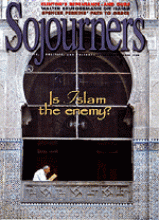An inordinate number of family members, friends, and friends’ family members have died in the last month. At memorial services and funerals, I have struggled to find meaning in the loss. From the pulpit we who mourned were reminded often of the "communion of saints"-those people of faith who have gone before us. But who are these saints?
The meaning and place of saints has evolved. In times past, saints have been viewed as the exemplary Christians, sanctified in holiness, who we were encouraged to emulate. The existence of saints gave the rest of humanity an out: I’m not a saint, so don’t expect so much of me. For similar reasons Dorothy Day demanded not to be made a saint as she didn’t want to be so easily dismissed. By categorizing saints as "special ones,"we lessen the responsibility that all the faithful live with integrity. Some disproportionately carry the load for all.
Modern demythologizing (and democratizing) has caused us to take saints off the pedestal, and to see them as very much like us. In many ways, our postmodern preoccupation has led us back to the early church notion that all believers are saints.
ROBERT ELLSBERG’S All Saints: Daily Reflections on Saints, Prophets, and Witnesses for Our Time (Orbis Books, 1997) offers images of the well-known and lesser known of the pantheon of saints, as well as the encouragement for each of us to live in a holy way. Ellsberg encourages that we recognize "the saints"because "we are formed by what we admire."
The universe of saints is expanded by this book. St. Francis, St. Philip, and Mary are joined by Fannie Lou Hamer, Mohandas Gandhi, and Martin Buber. And Ellsberg is willing to look through individuals’ flaws to see how God’s activity is manifest in their lives, making his book the most interesting book of saints available. Arranged into daily reflections, each on the life of a saint, it is a helpful desk reference for special liturgies or as a sermon "helper."
Read the Full Article
